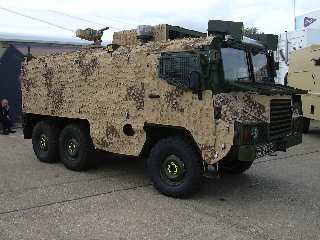File on 4 from the BBC have an episode on military procurement: “Gerry Northam asks why it seems so hard to buy the right equipment for our forces.”
Now there are many many problems with the UK military’s procurement process, and I hope to do a series on it, but this BBC ‘investigation’ completely failed to get past the symptoms, and instead blindly carried on with the short sightedness that drives some of those problems.
False economies of scale
Early on is the assertion that if all the army had the same vehicle, with the same engines and the same spares, think how much easier that would be to manage.
Which is only true in the most simple of ideal worlds: how much easier it would be to maintain computers, or showers, or cars, if they were all the same.
It is true, but it misses some major issues: (1) we want the right kit for the job, not some generic not-quite-good-enough-for-anything (2) circumstances change, and we can’t expect to upgrade everything everywhere all the time and (3) quite apart from anything else, in practice we have to buy what we can get, and that might mean buying some Jackals, some Panthers and some Mastiffs (or Cougars – what is it with the predatory animals?)
That means we will have different kit in different places, some of it rightly modified by local engineers to fit the local problems. Trying to enforce some centrally dictated and lengthy equipment procurement diverts effort from developing systems to support the real world, and even undermines them.
Soldiers are at put at risk because of…
The piece leaned heavily on soldiers who had been killed “due to” some problems with the equipment, leaving interviewees to try and start from scratch to explain problems with such a single-minded approach.
Soldiers – like many other professions – work in an inherently risky environment, and any who die can be used as an argument that better armour, better firepower, better gadgetry, better speed, better communication, better transport and so on might have saved their lives, while completely ignoring any of the costs that arrive with those improvements. Such as the problems of having more armour on the mobility or reliability of a vehicle.
Most decisions made by high level management are going to result in the deaths of soldiers in a warfighting environment; the costs must be balanced with the effects required. For example recently efforts are going into clearing houses by hand, rather than by dropping large explosives on them, thus preserving the property and shelter of local civilians. This results in more immediate risk and so more soldier deaths, but with the intended benefit of longer term peace. Any reporter criticising it with only “Soldiers die because of this!!!” should be ignored for extreme naivity.
The Vector’s failing wheel hubs
 Gerry is quite right to point out the failing points of the Vector (generally the wheel hubs that failed under the weight of the armour and the ground conditions) but then falls apart when doesn’t think through his follow on questions: “Did nobody think of it?” as if somehow hindsight should have been obvious in forsight.
Gerry is quite right to point out the failing points of the Vector (generally the wheel hubs that failed under the weight of the armour and the ground conditions) but then falls apart when doesn’t think through his follow on questions: “Did nobody think of it?” as if somehow hindsight should have been obvious in forsight.
Testing and evaluating the complete drivetrain of a vehicle for a variety of terrains and loads is not a ten minute job, and takes many months at best. If demands change then the vehicle would need to be re-tested and might never leave the testing ground.
Which is the main point missed; Gerry compares the failing Vectra with some mythical perfect vehicle, not the real world alternative: the Snatch Land Rovers (or indeed on the fairly bog standard unarmoured Land Rovers and Bedfords we had). The military bought Vectors because they needed something quickly, and they got it. It wasn’t right, but it was better than what they had, and when they failed the military resorted to the Land Rovers – until the better Mastiff turned up. A more interesting (but still hopelessly naive) question, might be: “Why didn’t they already have the perfect vehicle before we went to war?”
The top-heavy Puma
Again, the complaints are that there is something wrong with the existing kit, and how it should not be in service because it’s not right. Which would mean that more time should be spent developing equipment to a high level of safety, and while that is happening the troops have to wait.
The Mastiff Supply Chain
We get a little closer to interesting supply chain problems with the Mastiff, which had axle failures, and replacements were not available as the manufacturer’s priority was the American Army it was supplying as well, not the British.
Get me it now. And get me the fixes soon after
Programmes like these increase the political pressure for zero-risk purchases.
We should (in my obviously very humble yet quite right view, ahem) be looking at ways of informing those who need the equipment (the soldiers) with the problems in establishing supply chains, rather than trying to train more remote desk-bound procurement beaurocrats with what is required on the front line. With that is the key requirement that changes can be made; adaptations to the deployed equipment and new equipment quickly brought in to fill gaps or failures.